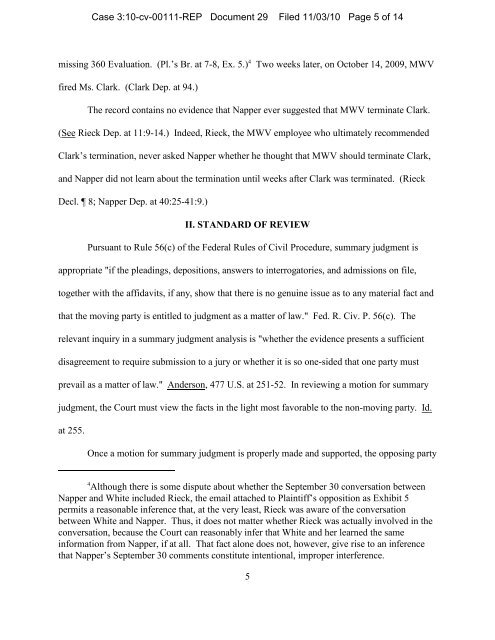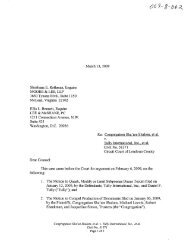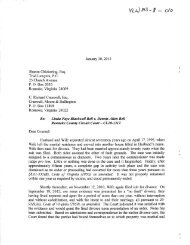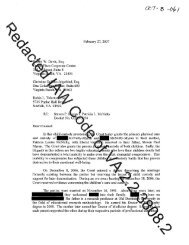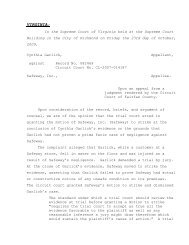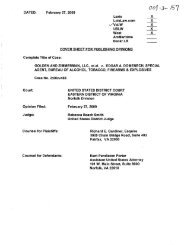In the united states district court for the - Virginia Lawyers Weekly
In the united states district court for the - Virginia Lawyers Weekly
In the united states district court for the - Virginia Lawyers Weekly
You also want an ePaper? Increase the reach of your titles
YUMPU automatically turns print PDFs into web optimized ePapers that Google loves.
4<br />
missing 360 Evaluation. (Pl.’s Br. at 7-8, Ex. 5.) Two weeks later, on October 14, 2009, MWV<br />
fired Ms. Clark. (Clark Dep. at 94.)<br />
The record contains no evidence that Napper ever suggested that MWV terminate Clark.<br />
(See Rieck Dep. at 11:9-14.) <strong>In</strong>deed, Rieck, <strong>the</strong> MWV employee who ultimately recommended<br />
Clark’s termination, never asked Napper whe<strong>the</strong>r he thought that MWV should terminate Clark,<br />
and Napper did not learn about <strong>the</strong> termination until weeks after Clark was terminated. (Rieck<br />
Decl. 8; Napper Dep. at 40:25-41:9.)<br />
II. STANDARD OF REVIEW<br />
Pursuant to Rule 56(c) of <strong>the</strong> Federal Rules of Civil Procedure, summary judgment is<br />
appropriate "if <strong>the</strong> pleadings, depositions, answers to interrogatories, and admissions on file,<br />
toge<strong>the</strong>r with <strong>the</strong> affidavits, if any, show that <strong>the</strong>re is no genuine issue as to any material fact and<br />
that <strong>the</strong> moving party is entitled to judgment as a matter of law." Fed. R. Civ. P. 56(c). The<br />
relevant inquiry in a summary judgment analysis is "whe<strong>the</strong>r <strong>the</strong> evidence presents a sufficient<br />
disagreement to require submission to a jury or whe<strong>the</strong>r it is so one-sided that one party must<br />
prevail as a matter of law." Anderson, 477 U.S. at 251-52. <strong>In</strong> reviewing a motion <strong>for</strong> summary<br />
judgment, <strong>the</strong> Court must view <strong>the</strong> facts in <strong>the</strong> light most favorable to <strong>the</strong> non-moving party. Id.<br />
at 255.<br />
Case 3:10-cv-00111-REP Document 29 Filed 11/03/10 Page 5 of 14<br />
Once a motion <strong>for</strong> summary judgment is properly made and supported, <strong>the</strong> opposing party<br />
4<br />
Although <strong>the</strong>re is some dispute about whe<strong>the</strong>r <strong>the</strong> September 30 conversation between<br />
Napper and White included Rieck, <strong>the</strong> email attached to Plaintiff’s opposition as Exhibit 5<br />
permits a reasonable inference that, at <strong>the</strong> very least, Rieck was aware of <strong>the</strong> conversation<br />
between White and Napper. Thus, it does not matter whe<strong>the</strong>r Rieck was actually involved in <strong>the</strong><br />
conversation, because <strong>the</strong> Court can reasonably infer that White and her learned <strong>the</strong> same<br />
in<strong>for</strong>mation from Napper, if at all. That fact alone does not, however, give rise to an inference<br />
that Napper’s September 30 comments constitute intentional, improper interference.<br />
5


